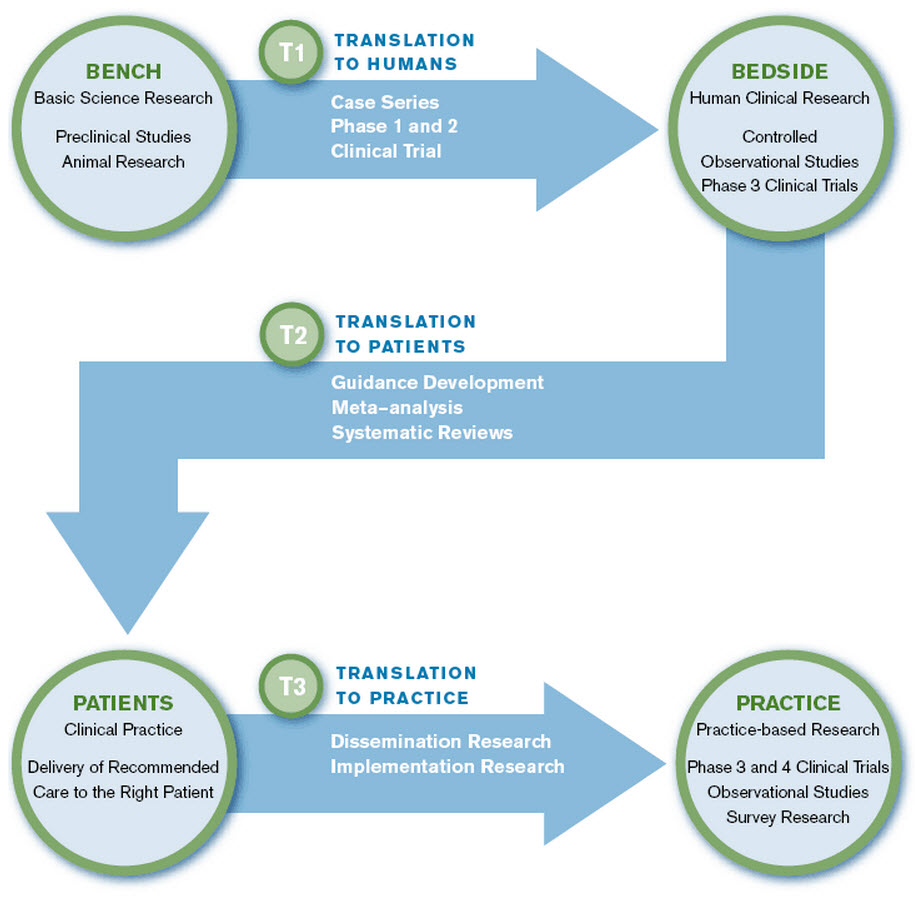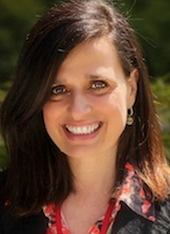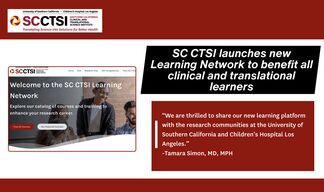SC CTSI Teaches New Clinical Investigators the Art, Science and Business of Team-Oriented Research
The KL2 Scholar Program helps investigators develop skills needed to pursue careers in translational research.
Educational institutions like USC are filled with scientists, physicians and other health science professionals who wanted careers that blend teaching, clinical practice, and research.
But those who choose the particular path of clinical and translational investigation, and who wish to drive their own research projects, need an additional set of skills that aren't part of the training in most degree programs. Traditionally, the acquisition of such skills required yet more years in the proverbial school of hard knocks, as new researchers learned to navigate the complex and competitive world of clinical investigation and to start and finish studies. Then they had to move their findings into application: it can easily take five, ten, even 20 years before discoveries are translated into clinical treatments.
SEE RELATED SUCCESS STORIES OF KL2 SCHOLARS
- Physician-scientist Mimi Kim uses novel MRI application to understand thyroid disorders in children - Read on
- Neurosurgeon William Mack investigates inflammation in search of new treatments for stroke patients - Read on
- Physician-scientist Joyce Javier develops culturally tailored research and health solutions - Read on
The National Institutes of Health (NIH) recognized this when they established the KL2 educational program within the NIH's Clinical and Translational Science Awards program, a national network of 62 programs that includes the Southern California Clinical and Translational Science Institute (SC CTSI) at USC and CHLA.
"But being a great clinical investigator also means being a strong manager, an executive, a visionary, and a leader. Our KL2 program was developed to help researchers develop these skills, as well." - Jonathan Samet, MD, MS, Director of the SC CTSI Education, Career Development, and Ethics program that administers the KL2 program.
Each year, the KL2 program accepts up to four junior faculty from USC and CHLA, including those holding professional health science degrees, such as MD, PharmD, DOT, DSN, DNP, DPT, and DDS, as well as research PhDs. The KL2 education curriculum is a combination of courses, seminars, work in progress, workshops and mentorship. All of this instruction is designed to give early-career not-yet-independent clinical translational scientists the know-how they need to obtain major grants and run high quality studies that may one day – hopefully sooner rather than later – result in new medical treatments and better health for Americans.
"Of course, the public and the academy expect that clinical researchers possess the highest levels of knowledge and expertise in their fields," said Jonathan Samet, MD, MS, Director of the SC CTSI Education, Career Development, and Ethics program that administers the KL2 program. "But being a great clinical investigator also means being a strong manager, an executive, a visionary, and a leader. Our KL2 program was developed to help researchers develop these skills, as well."

Jonathan Samet, MD, MS
The KL2 program seeks out candidates from diverse fields within health and science, including medicine, pharmacy, dentistry and other health disciplines, social work, behavioral sciences, and others. So far, 34 scholars, in four cohorts, have entered the KL2 program.
"While some of the K scholars have backgrounds in research, the majority of physicians and others with clinically-oriented professional degrees do not receive extensive training in either research or how research funding works," said Patino-Sutton. "The KL2 programs supports MDs and others with less research-oriented training to develop these skills so they can expand their careers into clinical translational research."
Teaching Teamwork
KL2 training is cross-disciplinary, by design. It includes instruction in the areas one would fully expect to see in clinical research – topics such as biostatistics, research study design, epidemiology, clinical trials, and bioethics, among others. But the three-year program also helps its scholars develop skills perhaps more commonly found in a business school curriculum, such as teamwork, management and leadership.
Given the complex, multi-disciplinary, and technology-reliant nature of much clinical research these days, teamwork is more important than ever – so important, in fact, that the NIH directed KL2 programs to find ways to teach teamwork and team leadership.

What is Translational Research? (Source credit)
After all, principal investigators commonly act as the chief executives of ad-hoc organizations of scientists, clinicians, research assistants and community partners, and the projects must be conducted under scientifically rigorous conditions and methodology.
"Without the skills to manage large groups undertaking complex tasks, success is far from guaranteed," said Cecilia Patino-Sutton, MD, MEd, PhD, Director of Education at SC CTSI. "We take a businesslike approach to our curriculum, and in fact, we have many guest lecturers from the business and communications schools who have ample experience in helping students acquire these skills."

Cecilia Patino-Sutton, MD, MEd, PhD
The Business of Science
The KL2 program is, above all, focused on the practical. It allows scholars to spend up to 75% percent of their time working on their own research, while getting feedback from their fellow K scholars, K faculty and mentors.
The most practical aspect of all is money – specifically, grant money. A tough economy has tightened purse-strings for public and private sources, and funding is highly competitive. So one of the program's primary goals is to help rising clinical researchers hone their grant-writing skills and complete a proposal that has a high likelihood of being awarded.
It can take months or even years for a researcher to prepare a grant proposal to the NIH or other funding source. The NIH, a source of many of the largest grants, rejects most applications it receives, and returns even promising ones with requests for changes and the possibility of applying a second time.
KL2 mentors who have been down that road already help K scholars strengthen their proposals: reading, editing, challenging, and referring them to other experienced researchers for additional comments. Within their first year, scholars must start writing a research proposal, and they must submit it by their third year.
"Your grant proposal has to be pristine or you won't have a chance of getting funded," said Patino-Sutton. "That's the current reality."
K scholars are also coached on their writing and presentation skills, activities increasingly recognized as crucial to professional scientists. Clinical and community health researchers cannot expect to hide in a lab, and if they dread public speaking, the KL2 program's instructors work to help them get over it.
"We videotape scholars presenting their research when they first arrive and again later in the program, and we evaluate their performance," said Patino-Sutton. "It's amazing to see the transformation, even after just a year."
Grading the Curriculum
Launched in 2006, the national KL2 program is itself still learning. Leaders from each of the programs regularly track their performance and share information about all aspects of teaching and mentoring scholars. It is all part of their effort to fulfill their mandate to create successful clinical and translational scientists and accelerate research.
"There are no established models of how to run programs like this or how best to teach some of these skills, and we're all trying to understand the most effective ways to work," said Patino-Sutton. "But all of the KL2's curriculum is designed to give researchers a vision of the entire spectrum of the business they're in, and it's a vision they can't get in any other program."
Learn more about the SC CTSI KL2 scholar program
SC CTSI is part of the 62-member Clinical and Translational Science Awards (CTSA) network funded through the National Center for Advancing Translational Sciences (NCATS) at the NIH (Grant Number UL1TR000130). Under the mandate of “Translating Science into Solutions for Better Health,” SC CTSI provides a wide range of resources, services, funding, and education for researchers and promotes online collaboration tools such as USC Profiles.



